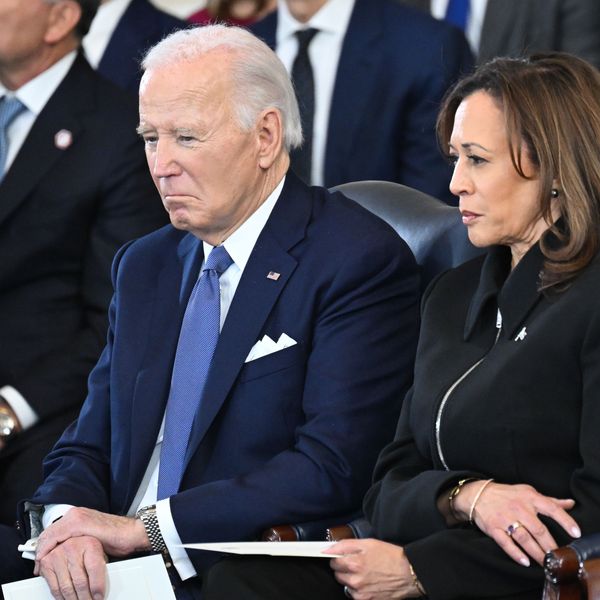Why Are House Dems Treating 2016 Campaign Autopsy Like a Classified Document?
Bottom line, says one commentator: "There's no good reason for the secrecy"
The Democratic Congressional Campaign Committee (DCCC), which works to elect Democrats to the U.S. House, has completed an investigative report into its own weaknesses and blind spots during last year's electoral failure.
With the party hoping to recoup years of losses during the upcoming 2018 mid-term elections, the review could be key to reversing Democrats' dismal fortunes.
There's just one problem: Few people know what the "autopsy" actually says--and the DCCC wants to keep it that way.
According to Politico, "[a]fter nearly five months, Rep. Sean Patrick Maloney (D-N.Y.) presented his investigative report to lawmakers during a members-only gathering at the Democratic Congressional Campaign Committee headquarters Thursday night." Only about two dozen lawmakers showed up, the outlet reports, and they were not permitted to leave with copies of the post-mortem.
The document may only be viewed "under the watchful eyes of DCCC staff," Politico writes.
Furthermore, Politico reports that Maloney's presentation "didn't focus on Democratic messaging and instead was heavily skewed towards money--how much the DCCC brings in, from where and how those funds are spent."
The committee defended its decision to keep the review secret, with a spokeswoman saying, "This analysis is based on strategic information about our organization and meant for internal purposes, not public consumption."
But that argument "is simply not persuasive," Sarah Jones wrote for the New Republic. First of all, "We are talking about a report on the status of the party's congressional campaign arm, not The Book of Kells. Unless it's written on precious vellum using ink squeezed directly from the hearts of elderly scribes, there's no good reason for the secrecy," Jones said.
More importantly, Jones added: "This latest incident is another data point in a troubling pattern. At any hint it may be asked to account publicly for its failures, the Democratic Party pulls up its drawbridge and retreats deep into itself. It does not seem to grasp that, as a political party, it has an obligation to be transparent to its supporters. It owes those supporters something. At the moment, it specifically owes them explanations about its weak and miserable state."
Indeed, with many worried that the Democratic leadership has failed to learn valuable lessons from last year's election--nevermind how to apply such lessons to future campaigns--reaction on social media was not kind to the decision to keep the report hidden.
\u201cLack of transparency is surely in the Dems' autopsy report somewhere, making the no-release decision a Star Trek style mind-ripping paradox. https://t.co/rQ5njggLHD\u201d— Matt Taibbi (@Matt Taibbi) 1493399578
\u201cWhat a predictable result from these clowns. \n\nHouse Democrats bury 2016 autopsy https://t.co/PsUzWsErs5 via @politico\u201d— #GeneralStrike #FreeAssange (@#GeneralStrike #FreeAssange) 1493385163
grab a seat, get comfy. we'll be in hell for a while https://t.co/P829TDYPiv
-- Kompromat Candidate (@lbourgie) April 28, 2017
An Urgent Message From Our Co-Founder
Dear Common Dreams reader, The U.S. is on a fast track to authoritarianism like nothing I've ever seen. Meanwhile, corporate news outlets are utterly capitulating to Trump, twisting their coverage to avoid drawing his ire while lining up to stuff cash in his pockets. That's why I believe that Common Dreams is doing the best and most consequential reporting that we've ever done. Our small but mighty team is a progressive reporting powerhouse, covering the news every day that the corporate media never will. Our mission has always been simple: To inform. To inspire. And to ignite change for the common good. Now here's the key piece that I want all our readers to understand: None of this would be possible without your financial support. That's not just some fundraising cliche. It's the absolute and literal truth. We don't accept corporate advertising and never will. We don't have a paywall because we don't think people should be blocked from critical news based on their ability to pay. Everything we do is funded by the donations of readers like you. Will you donate now to help power the nonprofit, independent reporting of Common Dreams? Thank you for being a vital member of our community. Together, we can keep independent journalism alive when it’s needed most. - Craig Brown, Co-founder |
The Democratic Congressional Campaign Committee (DCCC), which works to elect Democrats to the U.S. House, has completed an investigative report into its own weaknesses and blind spots during last year's electoral failure.
With the party hoping to recoup years of losses during the upcoming 2018 mid-term elections, the review could be key to reversing Democrats' dismal fortunes.
There's just one problem: Few people know what the "autopsy" actually says--and the DCCC wants to keep it that way.
According to Politico, "[a]fter nearly five months, Rep. Sean Patrick Maloney (D-N.Y.) presented his investigative report to lawmakers during a members-only gathering at the Democratic Congressional Campaign Committee headquarters Thursday night." Only about two dozen lawmakers showed up, the outlet reports, and they were not permitted to leave with copies of the post-mortem.
The document may only be viewed "under the watchful eyes of DCCC staff," Politico writes.
Furthermore, Politico reports that Maloney's presentation "didn't focus on Democratic messaging and instead was heavily skewed towards money--how much the DCCC brings in, from where and how those funds are spent."
The committee defended its decision to keep the review secret, with a spokeswoman saying, "This analysis is based on strategic information about our organization and meant for internal purposes, not public consumption."
But that argument "is simply not persuasive," Sarah Jones wrote for the New Republic. First of all, "We are talking about a report on the status of the party's congressional campaign arm, not The Book of Kells. Unless it's written on precious vellum using ink squeezed directly from the hearts of elderly scribes, there's no good reason for the secrecy," Jones said.
More importantly, Jones added: "This latest incident is another data point in a troubling pattern. At any hint it may be asked to account publicly for its failures, the Democratic Party pulls up its drawbridge and retreats deep into itself. It does not seem to grasp that, as a political party, it has an obligation to be transparent to its supporters. It owes those supporters something. At the moment, it specifically owes them explanations about its weak and miserable state."
Indeed, with many worried that the Democratic leadership has failed to learn valuable lessons from last year's election--nevermind how to apply such lessons to future campaigns--reaction on social media was not kind to the decision to keep the report hidden.
\u201cLack of transparency is surely in the Dems' autopsy report somewhere, making the no-release decision a Star Trek style mind-ripping paradox. https://t.co/rQ5njggLHD\u201d— Matt Taibbi (@Matt Taibbi) 1493399578
\u201cWhat a predictable result from these clowns. \n\nHouse Democrats bury 2016 autopsy https://t.co/PsUzWsErs5 via @politico\u201d— #GeneralStrike #FreeAssange (@#GeneralStrike #FreeAssange) 1493385163
grab a seat, get comfy. we'll be in hell for a while https://t.co/P829TDYPiv
-- Kompromat Candidate (@lbourgie) April 28, 2017
The Democratic Congressional Campaign Committee (DCCC), which works to elect Democrats to the U.S. House, has completed an investigative report into its own weaknesses and blind spots during last year's electoral failure.
With the party hoping to recoup years of losses during the upcoming 2018 mid-term elections, the review could be key to reversing Democrats' dismal fortunes.
There's just one problem: Few people know what the "autopsy" actually says--and the DCCC wants to keep it that way.
According to Politico, "[a]fter nearly five months, Rep. Sean Patrick Maloney (D-N.Y.) presented his investigative report to lawmakers during a members-only gathering at the Democratic Congressional Campaign Committee headquarters Thursday night." Only about two dozen lawmakers showed up, the outlet reports, and they were not permitted to leave with copies of the post-mortem.
The document may only be viewed "under the watchful eyes of DCCC staff," Politico writes.
Furthermore, Politico reports that Maloney's presentation "didn't focus on Democratic messaging and instead was heavily skewed towards money--how much the DCCC brings in, from where and how those funds are spent."
The committee defended its decision to keep the review secret, with a spokeswoman saying, "This analysis is based on strategic information about our organization and meant for internal purposes, not public consumption."
But that argument "is simply not persuasive," Sarah Jones wrote for the New Republic. First of all, "We are talking about a report on the status of the party's congressional campaign arm, not The Book of Kells. Unless it's written on precious vellum using ink squeezed directly from the hearts of elderly scribes, there's no good reason for the secrecy," Jones said.
More importantly, Jones added: "This latest incident is another data point in a troubling pattern. At any hint it may be asked to account publicly for its failures, the Democratic Party pulls up its drawbridge and retreats deep into itself. It does not seem to grasp that, as a political party, it has an obligation to be transparent to its supporters. It owes those supporters something. At the moment, it specifically owes them explanations about its weak and miserable state."
Indeed, with many worried that the Democratic leadership has failed to learn valuable lessons from last year's election--nevermind how to apply such lessons to future campaigns--reaction on social media was not kind to the decision to keep the report hidden.
\u201cLack of transparency is surely in the Dems' autopsy report somewhere, making the no-release decision a Star Trek style mind-ripping paradox. https://t.co/rQ5njggLHD\u201d— Matt Taibbi (@Matt Taibbi) 1493399578
\u201cWhat a predictable result from these clowns. \n\nHouse Democrats bury 2016 autopsy https://t.co/PsUzWsErs5 via @politico\u201d— #GeneralStrike #FreeAssange (@#GeneralStrike #FreeAssange) 1493385163
grab a seat, get comfy. we'll be in hell for a while https://t.co/P829TDYPiv
-- Kompromat Candidate (@lbourgie) April 28, 2017

